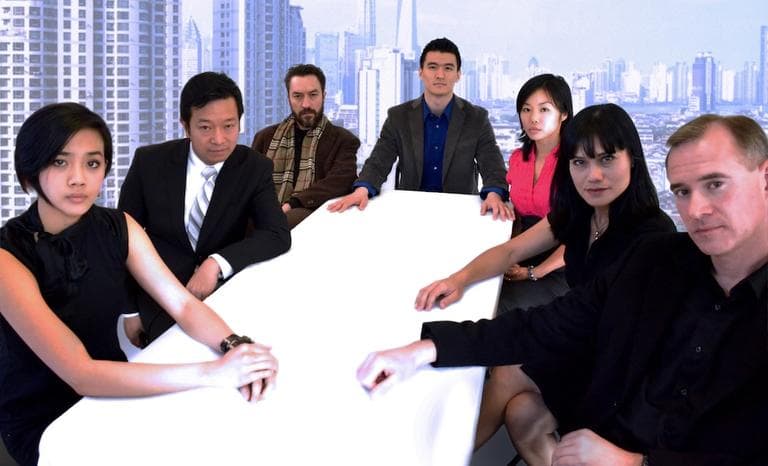Advertisement
Lyric, Larry Coen Get Serious About Local Asian-American Acting Community

Larry Coen is one of the funniest fellows in the local theater community. He’s a supremely gifted comedian, an accomplished director (he won last year’s Elliot Norton Award for the hilarious production of “The Divine Sister” and two years previously for “Phantom of the Oprah”), and he even cowrote a play, “Epic Proportions,” that made it to Broadway. (He also has the most laugh-out loud postings of anyone I know on Facebook.)

His pacing of “Chinglish,” particularly getting the most out of comic moments without going over the top, is part of the reason why the Lyric Stage Company of Boston production (through Dec. 23) under his direction is such a success.
Coen gets serious, though, when he talks about issues affecting Boston theater. I bumped into him on my way into “Chinglish,” David Henry Hwang’s play about cultural differences – and similarities – between America and China and he was saying how thrilled he was with the local Asian-American acting pool.
You can see why. The actors playing the five Chinese roles are all excellent – the two Caucasians aren’t tuna fish either. In a recent phone chat, Coen said, “People in the theater community had said to me, ‘You’ll never be able to cast it locally. There aren’t enough good Asian actors. There certainly aren’t enough good actors who speak Mandarin.' ” Wrong, wrong, wrong. Coen says there was enough talent in the auditions to have been able to cast the play two or three times over. “There was a huge turnout for the audition. I was able to cast it in one session, which is extremely rare. The interest and depth of talent went well beyond what conventional wisdom said was possible.”
The play is a great showcase for the actors because there’s a lot of silliness, particularly in the first act, over bad translations of Chinese signs into English. “Slippery when wet” becomes “To take notice of safe: The slippery are crafty” and a handicapped restroom becomes “Deformed man’s toilet.” Barlow Adamson is an American businessman in China — Guiyang, specifically — trying to pitch them on better signage. The second act is a much more serious discussion of the sacrifices that both economic systems demand of the souls of the citizenry, so there's plenty of room for both comedy and pathos.
Here's a taste:
Michael Tow as the minister and Celeste Oliva as his assistant are particularly impressive in seguing easily between comedy and drama as their parts call for a wider range, but Tiffany Chen, Chen Tang and Liz Eng in supporting roles obviously have the goods as well. Providence actor Alexander Platt is also excellent as the Mandarin-speaking Caucasian interpreter.
Oliva thinks that Coen's experience with the local Asian-American community "is the kind of wakeup call we get in America" and praises Coen, the Lyric and "Company One, which specializes in plays and casts that speak more to diversity." She also says that when there are more plays like "Chinglish" and those at Company One, then "people start sticking around" instead of going off to New York. (Not that there aren't problems there.)
Two of the more progressive forces in Celeste Oliva's career have been "Shear Madness" and Clint Eastwood.
And there’s another issue. Nontraditional casting has been around for the past 25 years or so. If a play isn’t about race then a casting director should not assume the actors have to be all white just because the playwright is white. Mixing and matching white actors with people of color, even within a family – unless it’s “Raisin in the Sun” or a play about race, like David Mamet's "Race" – should also be encouraged. Both Coen and Oliva wonder why directors can't cast more people of color in plays that don't have anything to do with race. Oliva points out that casting white and nonwhite actors within a family "mirrors today's modern family, including my own."
Tow is more sanguine about colorblind casting. "It’s not that I wouldnt like to play non-Asian roles, but understanding the dynamics of the industry, it’s a lot more difficult to go in for those roles when you know a lot of things aren’t going in your favor." But it’s changing in terms of stereotypes, he says, pointing to "very good roles that I've had the opportunity to play — Company One's 'After The Quake' or 'Chinglish' that feature characters with a lot of depth and they're not just stereotypes."
Two of the more progressive forces in Oliva's career, oddly enough, have been "Shear Madness" and Clint Eastwood. She plays Barbara DeMarco, an Italian character, in "Shear Madness," and Eastwood cast her in "Mystic River" in a part written to be an Irish police trooper, Jenny Coughlin. He apparently liked what he saw on tape and went with her.
Oddly, theater directors, in general, aren't as liberal as Eastwood. Coen says Asian-American actors have been getting the short end of the stick on both counts — they’re not cast in parts that aren’t racially specific while some casting directors feel that they can cast Caucasian actors in Asian parts in the name of diversity.
Coen hopes that “Chinglish” will provide a showcase for directors to get a smattering of some of the talent that’s out there and not buy into the myth that there isn’t depth in the local pool of actors.
They’ll also get to see a pretty neat director at work on a play that shows Hwang wasn’t a one-hit wonder with “M Butterfly.” This isn’t as good a play as that, but it certainly makes you think twice about the relationship between the two superpowers. As for the seven fine actors on stage, let’s hope along with Coen that we see a lot more of them on Boston stages.
This program aired on December 12, 2012. The audio for this program is not available.

